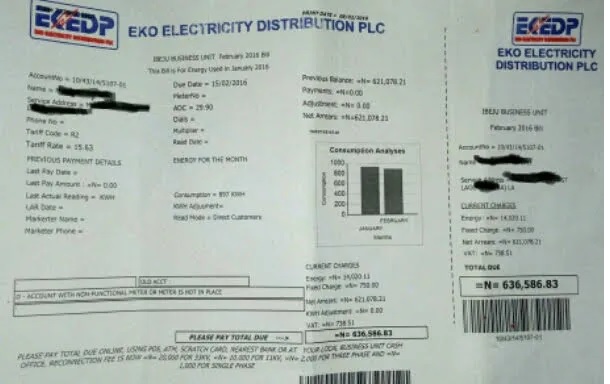There are several types of utility bills that residents of Nigeria pay periodically to keep on enjoying certain basic services such as electricity, cable television, water, and internet. In this article, we will be discussing the different types of utility bills in Nigeria. Keep on reading to discover what they are.

The types of utility bills in Nigeria would be discussed below:
-
Electricity Bill
Electricity bill payments are among the most common types of utility bills in Nigeria. Anyone that uses the public electricity supplied by the Electricity Distribution Companies in Nigeria is expected to pay for it. Prepaid and postpaid electricity bill payments are the common ways people make payments for electricity consumption in Nigeria. The prepaid method of electricity payment was introduced so that Nigerian residents and businesses can only pay for the exact unit of electricity consumed by their houses, offices, or industrial buildings. On the other hand, the postpaid method of electricity bill payment was the most popular during the time the National Electricity Power Authority (NEPA) was in charge of electricity distribution in Nigeria. Postpaid electricity payment requires an individual to make payments only when electricity has been consumed, and it usually comes in the form of estimated billing.
-
Waste Collection Bill
Residents in many parts of the country pay for their waste to be collected by accredited government agencies in charge of waste or private waste management services. In most states in Nigeria, these waste disposal agencies collect waste bins every week or periodically. Examples of such waste collection agencies in Nigeria include Lagos State Waste Management Authority (LAWMA), Del Waste Management Company, Waste Point Limited, Fedoz Nigeria Limited, and Tuka Resources Ventures, among others. Sometimes, these waste disposal companies do not collect trash or waste from residents as when due. As an alternative, people patronize local truck pushers to help dispose of their waste at a faster pace and cheaper rate. This, however, is frowned upon by the government as some of these informal waste disposals dump waste on public roads and other non-designated dump sites.
-
Internet and Telephone Bill
As of December 2021, the Nigerian Communication Commission put the number of subscribers to the four major telecommunication operators at about 195.4 million. In the same vein, NBC estimated internet subscribers in Nigeria to be about 141 million. MTN, 9mobile, Airtel, and GLO are the major telecommunication service operators with GSM licenses and they provide their subscribers with internet and telephone services. The rate for internet and voice calls bills vary from one telecommunication provider to another, however, they are quite affordable for the common man to afford. The payment for these services rendered by telecommunication companies may be made in advance or in arrears, depending on the choice of the subscriber.
-
Water Bill
In some states in Nigeria such as Enugu, some residents rely on water supplied by the state through the Water Corporation. To enjoy this public water supply, residents are expected to pay water bills every month or at specific intervals. Although the Water Corporation has been around since the 1980s, its inefficiency has led many Nigerians to resort to sinking water wells and installing borehole pipes to get their privately-owned water installed in their homes, offices, or other buildings.
-
Cable TV Subscription
Cable TV subscription is among the popular types of utility bills paid by many Nigerians. Popular cable television services such as DSTV, TSTV, and Startimes offer Nigerians various subscription packages to enjoy premium television entertainment ranging from sports to soap operas, and reality TV shows, among others. Subscribers to any of these cable television service providers would have to make periodic payments, usually, every month before they can get access to the programmes and TV stations offered in the bouquet of their choice. In addition, Netflix and Showmax are online movie streaming platforms that Nigerians pay to access a range of movies and shows.
-
Security Dues
This is popularly known as “vigilante dues” in some parts of the country. This type of utility bill is to curb burglary, stealing, and other nefarious activities performed at night in residential areas. Security dues are usually imposed on residents of a residential estate by the management of such estates as the Community Development Authority (CDA). As each household keeps on contributing their quota for security, the security rendered would communally benefit contributing units.
-
Service Charges
Service charges are a type of utility bill that is usually imposed on individuals that are residing in a house in an estate or an apartment in a block, to provide maintenance and repairs within such an estate or apartment block. This utility bill is usually indicated in the lease or tenancy agreement, outrightly stating the exact sum to be paid and the intervals for which the payment is expected to be made. Landscape maintenance, cleaning of the gutters and drainages, and salaries of estate staff are some of the ways service charges work to ensure the estate or apartment block runs without hiccups.
In Nigeria, paying for utility bills has become much easier by the day as there are several platforms where one could make payments for these services online. Banking institutions in Nigeria have made it possible for their customers to make payments for utilities such as electricity, water bills, waste collection, cable television subscriptions, and the internet from their mobile banking applications. Jumia, Flutterwave, Opay, and Quickteller are examples of non-banking platforms that also allow Nigerians to pay their utility bills using any internet-enabled device such as an android smartphone, tablet, or laptop. To put this in context, consider the following statistic brought forward by the Nigeria Inter-Bank Settlement System in which Nigerians spent N1.629 trillion electronically on utility bills from January to July of 2022. This is a huge leap from the recorded N1.28 trillion spent in the corresponding period of 2021 for payment of utilities using online platforms. This clearly shows that online payment platforms have become very reliable for paying utility bills.